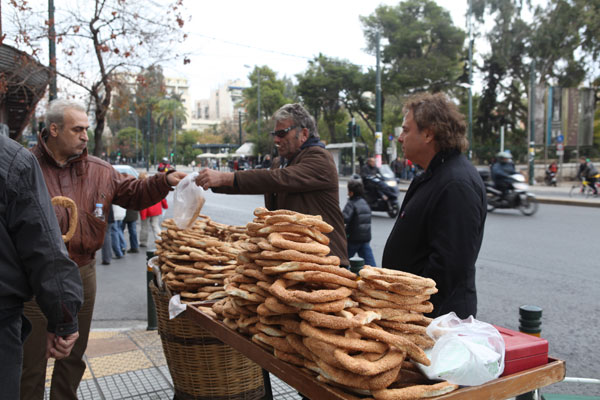 |
|
Cousins Kosta Makrhs and Angflo Drakos can earn the equivalent of a US quarter for each piece of bread they sell a block from Syntagma (Constitution) Square, which is a center for protests of Greece's austerity measures. Makrhs understands austerity. The reeling economy cost him his job as a waiter when the restaurant closed last year. Photos by Fu Jing / China Daily |
Anger on the streets as crime, unemployment and suicide rates continue to climb. Fu Jing reports from Athens.
In afternoons, 35-year-old Markos walks his dog in the quiet woods on Mount Lycabettus, overlooking Athens. But he's not in the mood to enjoy the tranquility or the leisure.
All this free time belongs to retired people like his parents, he said. "The problem is that when you get up every day, you don't have something to do."
Markos, who didn't want to be fully identified, was laid off in March by the government-owned Olympic company, which has airline, tourism, real estate and other operations.
Because he speaks fluent English and has experience in tourism promotion, Markos had expected no problems in landing a new job. However, since the debt crisis erupted in May 2010, the government has cut public-sector jobs, as well as salary and social welfare payments.
Meanwhile, uncertainty, panic and pessimism have dominated the country, and investors are not willing to risk opening new businesses. "So finding a job is extremely hard," Markos said.
With the economy shrinking for a fourth consecutive year, the young continue to be the hardest hit. More than four of every 10 people ages 18-25 are out of work.
And their situation is likely to be even worse next year. Both the European Union (EU) and the International Monetary Fund (IMF) have forecast that Greece's economic freefall won't end before 2013.
Not every Greek has responded to the tough times as quietly as Markos, who thinks the new coalition government led by Lucas Papademos will give Greece a new chance. Many others have joined streams of demonstrations.
General strikes in October shut down services across the country for two days, and the trade unions are planning a 24-hour general strike on Thursday to protest next year's austerity budget. It will be the first major walkout since the appointment of the interim coalition government in early November.
Over the past two years, Greeks have held dozens of strikes and demonstrations against the repeated rounds of salary cuts and tax increases. All the pain and hardship have also pushed them to heatedly debate whether to stay in the eurozone.
|
 Above: Students march in Athens as the debt crisis worsens in Greece. Nearly 44 percent of 18- to 25-year-olds have no jobs. Below: Even dogs get in the act. This sign reflects an old saying about victory in battle, or death. |
'Alarming worries'
"This is a decision our country should make soon," Kosta Makrhs said last week as students marched to the lower end of Syntagma Square, the plaza facing the Greek parliament.
Makrhs, who has daughters 16 and 9, and his cousin Angflo Drakos don't want to miss any protest, but they are not participants. With a shabby stall a block from the square, they sell bread to the protesters. "Not so many people come to buy, but demonstrations are walking fairs for us," says Makrhs, who can earn 25 cents for each piece of bread he sells at 50 cents.
Makrhs used to wait tables in a restaurant, but he lost his job last year when bleak business forced it to close. His wife still works in a furniture factory in Athens and earns about 1,100 euros a month. With his tiny income from selling bread, the family can barely make ends meet.
"There are many alarming worries in my country," Makrhs said. He is most concerned about the growing numbers of homeless and hungry people who roam the streets and the rising count of drug addicts and suicides.
According to official data cited by the Guardian newspaper in the United Kingdom, 5,000 suicides in Greece were reported in the first eight months this year, compared with 2,500 for all of last year. Idle people roam the streets of downtown Athens, and theft and robbery are rampant. Police and security guards are patrolling, but often are seen to continue their chatting and smoking after hearing a robbery call.
"These are alarming phenomena," Makrhs said.
Meanwhile, he said, the children have been severely affected by the austerity measures. For example, the salary of teachers at his daughters' school was reduced by half to 600 euros a month, and now the teachers don't show up sometimes. Textbooks used to be free; now there is a charge. And if his children get sick, he said, they must wait a month for treatment because the hospitals don't have enough hands.
"The government should correct these as quickly as possible," Makrhs said. Otherwise, he said, poor education will not prepare them to compete as adults in a world economy.
Time to move
Greece will strengthen the austerity measures required to meet the target of deficit reduction set by the EU, IMF and European Central Bank. They include additional wage cuts, pension cuts, layoffs for public sector employees and changes to collective bargaining rules to make it easier to hire and fire. Very soon, about 30,000 public servants will be laid off.
To avoid being further affected by the austerity that might last for years, many Greeks are choosing to return to rural areas, where they can maintain a better standard of living at less cost. And some people are fleeing to other countries where they can find jobs.
Malkit Singh, who moved to Greece from India 20 years ago, is one of them. Singh has driven a taxi in Athens for years, but he said business has dropped off markedly because others are out of work.
Fewer Greeks can afford to take taxis. And foreign investors and tourists hesitate to come to Athens because strikes and others protests often cause the cancellation of flights and ferry services and the closing of government offices and tourist sites. Because business is so poor, some taxi drivers take unnecessary detours to add distance, and thus money, to their fares.
Singh said he is honest. But his net income has dropped from 80-100 euros a day to 15-20 euros. And he has to work 11-13 hours every day. He says it is not true, as some people say, that Greeks are enjoying more leisure than other parts of the world.
"For us ordinary people, it is never the case," Singh said. "Now that survival has turned out to be too hard here, I cannot see any hope."
Singh said he wants to open a shop to sell Chinese goods in his home country, and is sounding out his relatives in India about the possibility.
 |
|
A cleaning lady works on Mount Lycabettus,overlooking Athens. [Photos by Fu Jing / China Daily] |
Dilemmas everywhere
Greece has long been accustomed to spending beyond its means. Officials have admitted the government has cooked the books in the past, producing false fiscal statistics, and has turned a blind eye to tax evasion.
As a result, the country has now accumulated a debt load of 360 billion euros - five times the size of Argentina's default in 2001.
And even if the austerity measures are fully implemented and half of the debt held by private banks is written off, Greek debt will still be 120 percent of its gross domestic product by 2020. The benchmark set by the EU is 60 percent of GDP.
Every recipe for the crisis has put the government in a difficult position. If Greece stays in the eurozone, its leaders must submit a written guarantee to the EU to pursue its austerity drive to meet its fiscal targets and reduce the budget deficit to avoid bankruptcy. And it must continuously take an axe to the public sector, chipping away at its 800,000 jobs.
However, these austerity measures will deepen the recession, result in less job creation and further worsen social unrest. There is no fiscal maneuver available to boost the economy.
This is why Greeks are debating whether Greece should retain EU membership. "It is a big issue and it is still uncertain," said Nikis Koutsiaras, a lecturer in EU economic and social policy at the University of Athens.
Because of the worsening economic prospects and the social cost of the crisis, Koutsiaras is afraid the political situation may worsen. "I am not sure if the technocratic government, which has been appointed for an interim of three months, will survive for that time," he said. "There is a high risk it will fall before the three months, and this depends on whether or not Greece will remain in the eurozone."
Koutsiaras said the crisis has made most Greeks both fearful and ignorant. "They are not panicking about the issue. If anything they are apathetic."
He said it is impossible to predict what will happen, as there are many technical aspects and people tend to display signs of apathy. Socially and economically, people are exhausted. "In turn I think this may lead to social upheaval," Koutsiaras said.
Seeking inspiration
Not all Greeks are pessimistic. Christos Vlachos, director of the Greece-China Business Council, based in Athens, said the country still has many historic, economic, cultural, social and geographical assets.
Vlachos, who is in China for business talks, said the country urgently needs political unity and for the leaders to show decisive courage and determination to lead the people out of the woods.
"Greeks need to be inspired with the leaders' short-term measures and long-term vision," he said. "For example, can Greece think about asking for China's investment to build a high-speed railway to link Athens and Thessalonica? It is unthinkable what kind of miracle this 500-kilometer project can bring for Greece, whose population is less than 11 million, just half of Beijing's.
"We have been waiting a long time for inspiring decisions from our leaders," Vlachos said. "They should think beyond austerity and we should not be let down again and again."
Eveline Filon contributed to this report.
